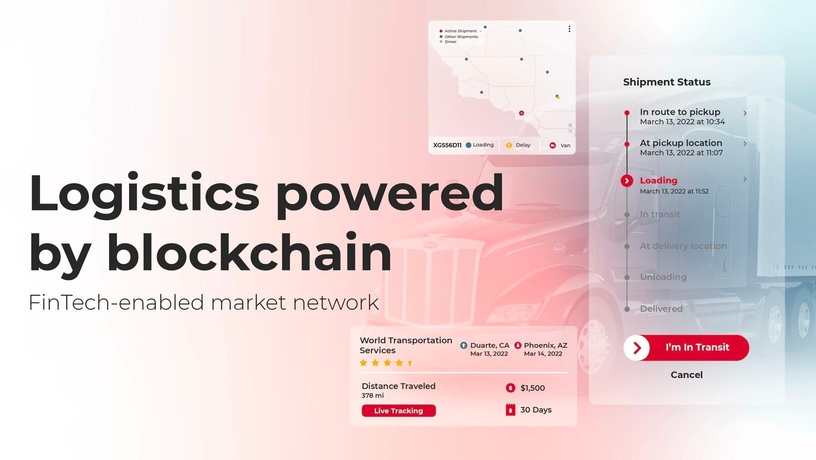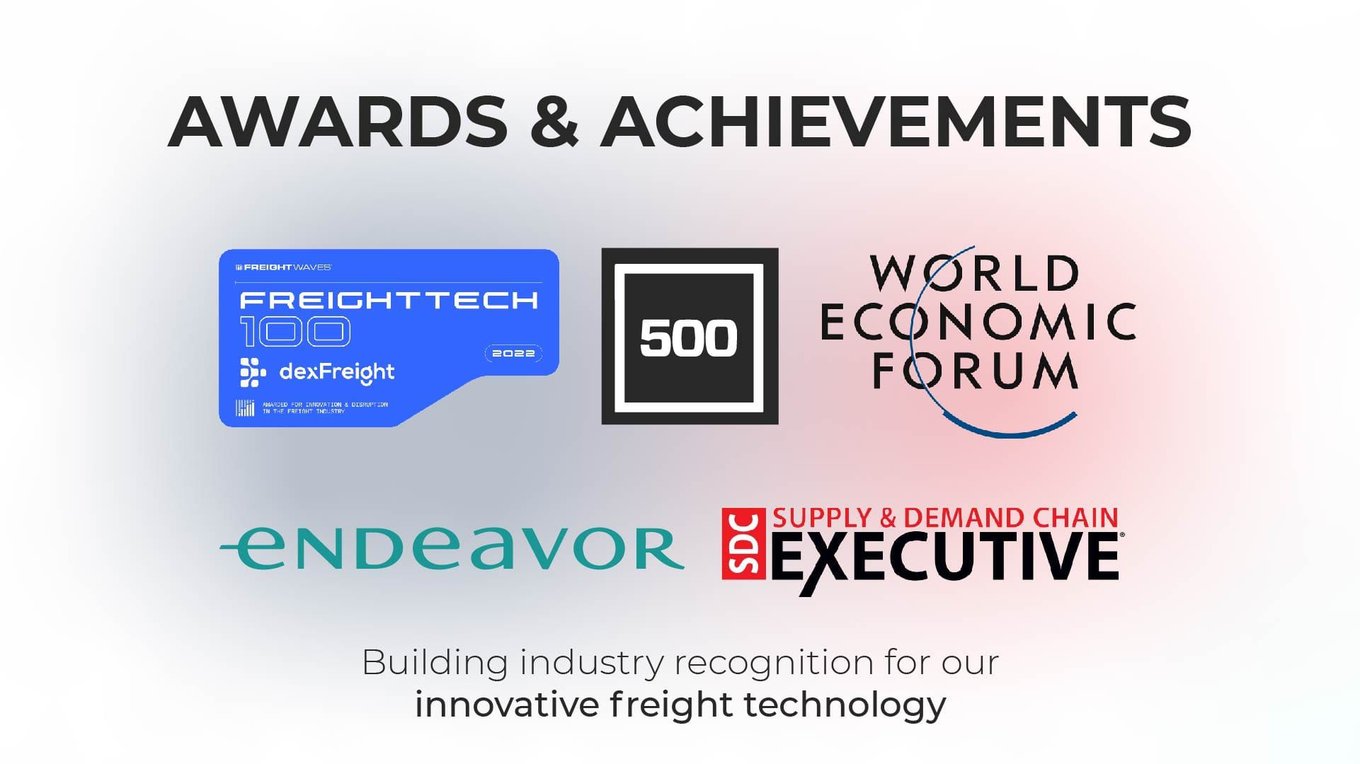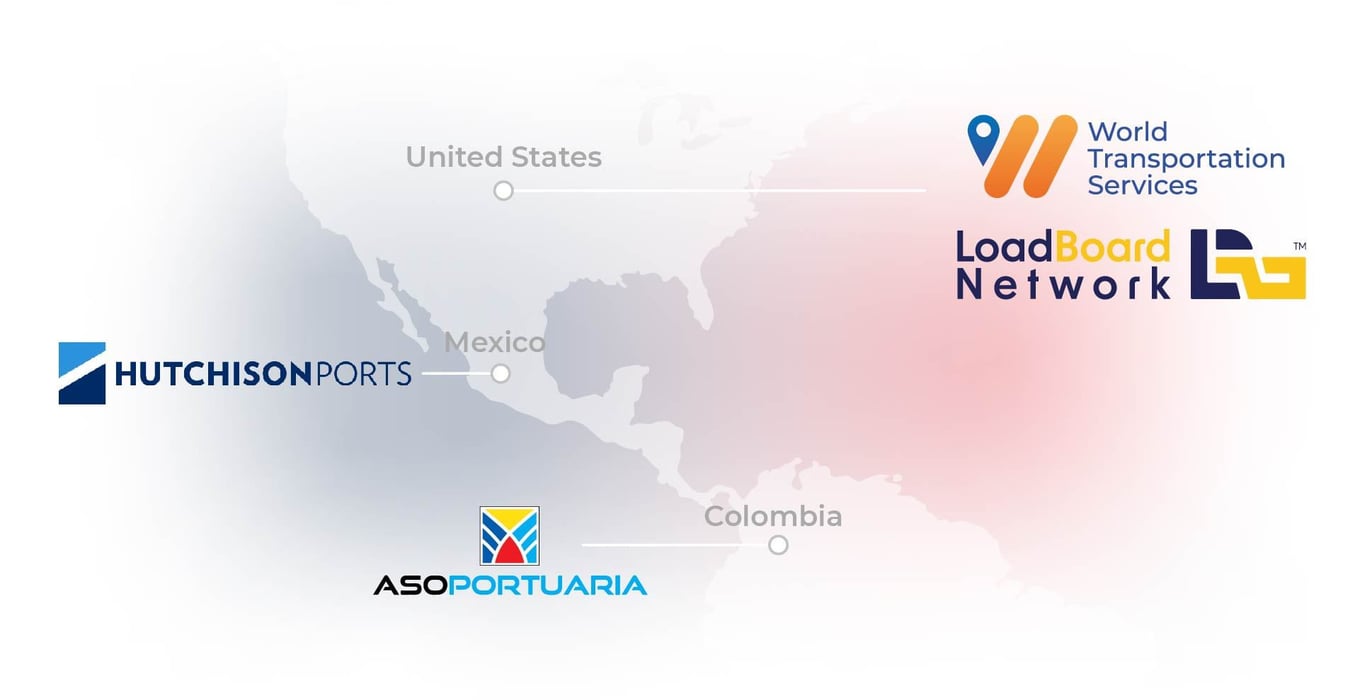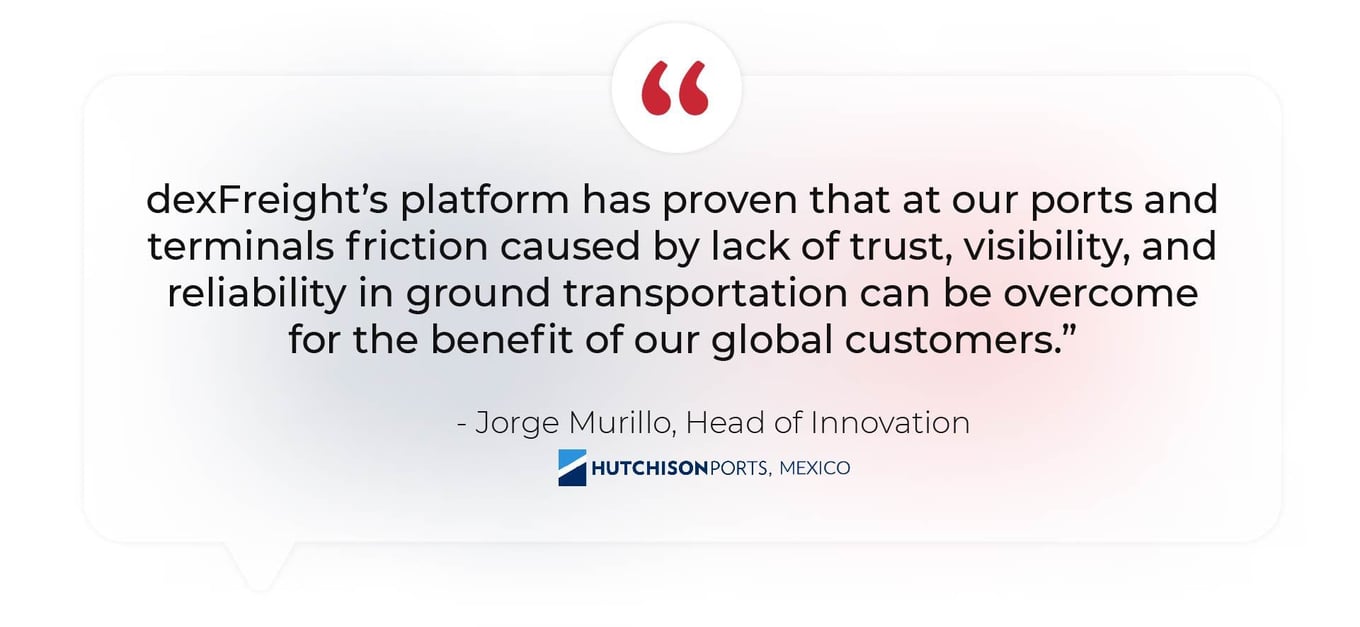"We are coming out of the gate with the LoadBoard Network software but the best part is the infrastructure is all new. Th...
Problem
Fragmentation and lack of liquidity are a multi-billion-dollar problem for logistics
—
Multiple companies
working in isolated networks
—
Logistics is one of the most
fragmented industries globally
In the U.S. alone, there are over 900,000 trucking companies supplying capacity, with 91% of them operating six trucks or less. On top of that, 17,000 freight brokers and millions of shippers compete daily for the best freight rates in the space. Globally, the market composition is remarkably similar.
Freight companies use various independent systems to support their operations, resulting in:
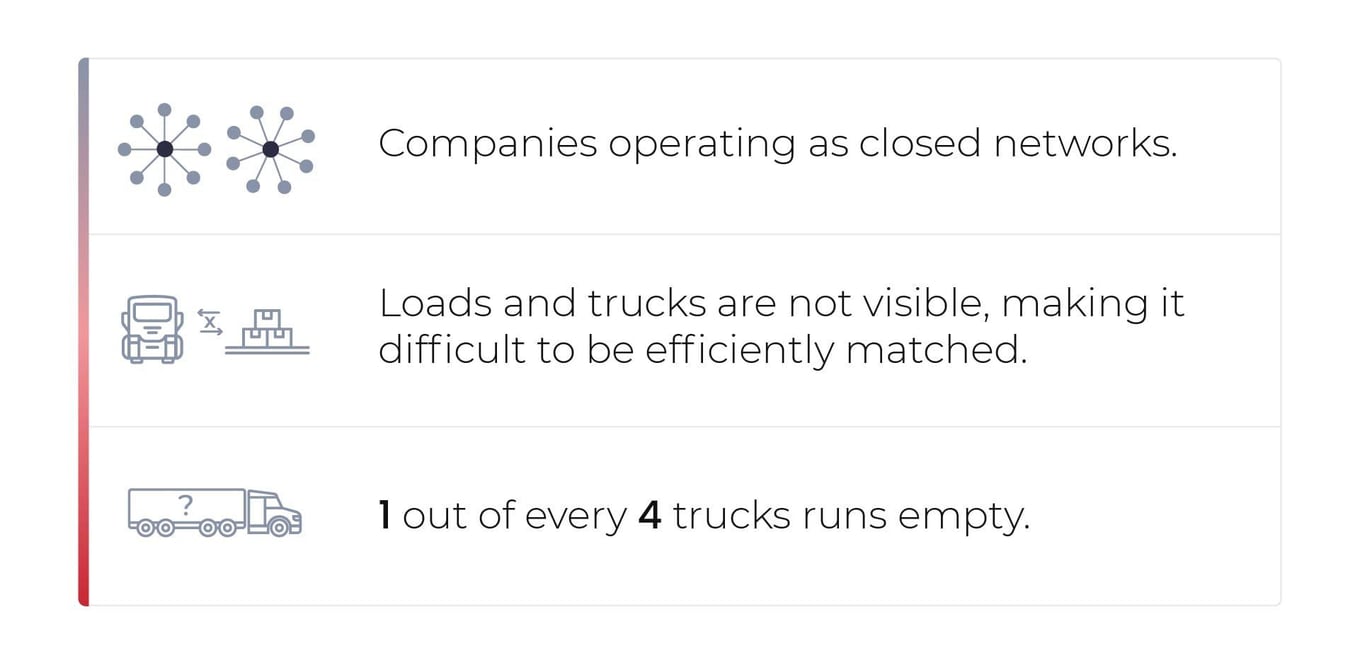
—
Small companies are at constant
risk due to lack of liquidity

It is not uncommon for larger shippers to implement long payment cycles, putting a lot of pressure on small trucking companies’ cash flows.
Trucking companies are typically paid 37 days after providing their services. Meanwhile, truckers must pay for gas, tolls, and other expenses, leading to liquidity problems. Given that most of these trucking companies are small businesses, they frequently overcome their cash flow problems by factoring in their receivables for an average of 3% fees.
Solution
Virtually consolidating logistics
Solving logistics fragmentation
and lack of liquidity through smart contracts

—
Open Logistics Protocol:
A public utility backend powered by blockchain
Our thesis is that most of the existing freight brokers and trucking intermediaries will become digital over time. Hence, thousands of freight matching applications will emerge, adding to the already fragmented industry.
dexFreight is part of a group of leading freight-tech companies working closely to bring to market the first decentralized “Open Logistics Protocol.” This public utility backend is designed to standardize and bridge the gap between closed networks, where load boards, freight matching apps, ELDs, and TMS platforms can connect, allowing end-users to exchange live market information safely. Instead of integrating with hundreds of apps, ELDs, and TMS, companies “connect once” to the protocol, potentially increasing the ROI. A substantial amount of code has been written, and the protocol is live in Ropsten (Ethereum) testnet.
This Web3 public utility backend preserves data ownership and provides cross-company workflow automation while equitably distributing the value created by the protocol. A paradigm shift that will unlock the level of efficiency, collaboration, and business model innovation required to solve the multi-billion dollar empty mile problem in logistics.
—
Connecting DeFi with the
multi-trillion dollar logistics industry
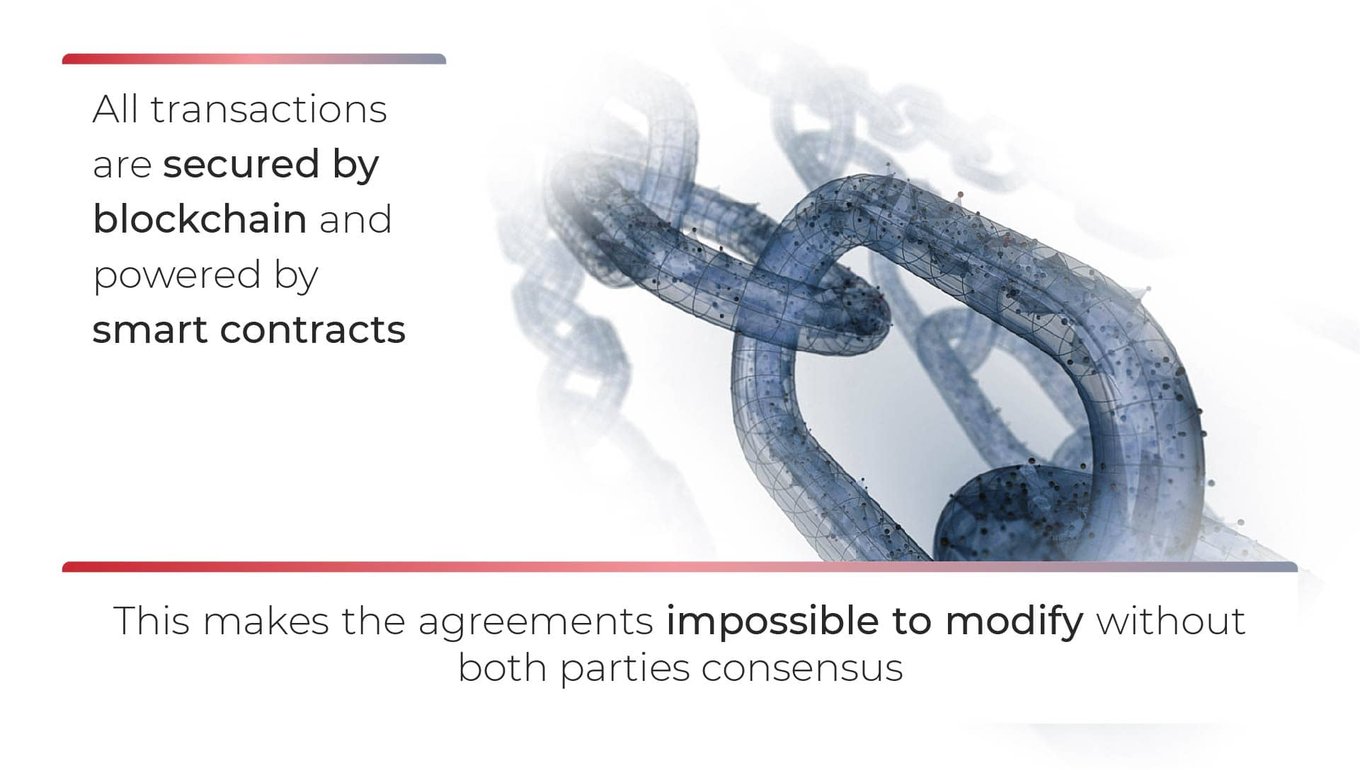
All agreements in dexFreight are cryptographically signed by the transacting parties, creating a digital representation of each rate confirmation using Non-Fungible Tokens (NFT). Using algorithms designed to evaluate risk, these digital assets with a defined dollar value get assigned a Loan-To-Value parameter (LTV), so they can be pledged as collateral in the Decentralized Finance (DeFi) ecosystem. This patent-pending technology is used to source liquidity from pools already available in Web3 money market protocols like Maker, AAVE, Sovryn, etc, to effectively provide users with immediate, cheaper, and programmable financing options, getting carriers paid as soon as they deliver, and thus solving the liquidity problem.
Product
Streamlining logistics from posting to payment
dexFreight is a FinTech-enabled market network for freight companies to handle shipments from posting to payment in one place using smart contracts. It connects carriers, freight brokers, and shippers through an open logistics network built on decentralized protocols.
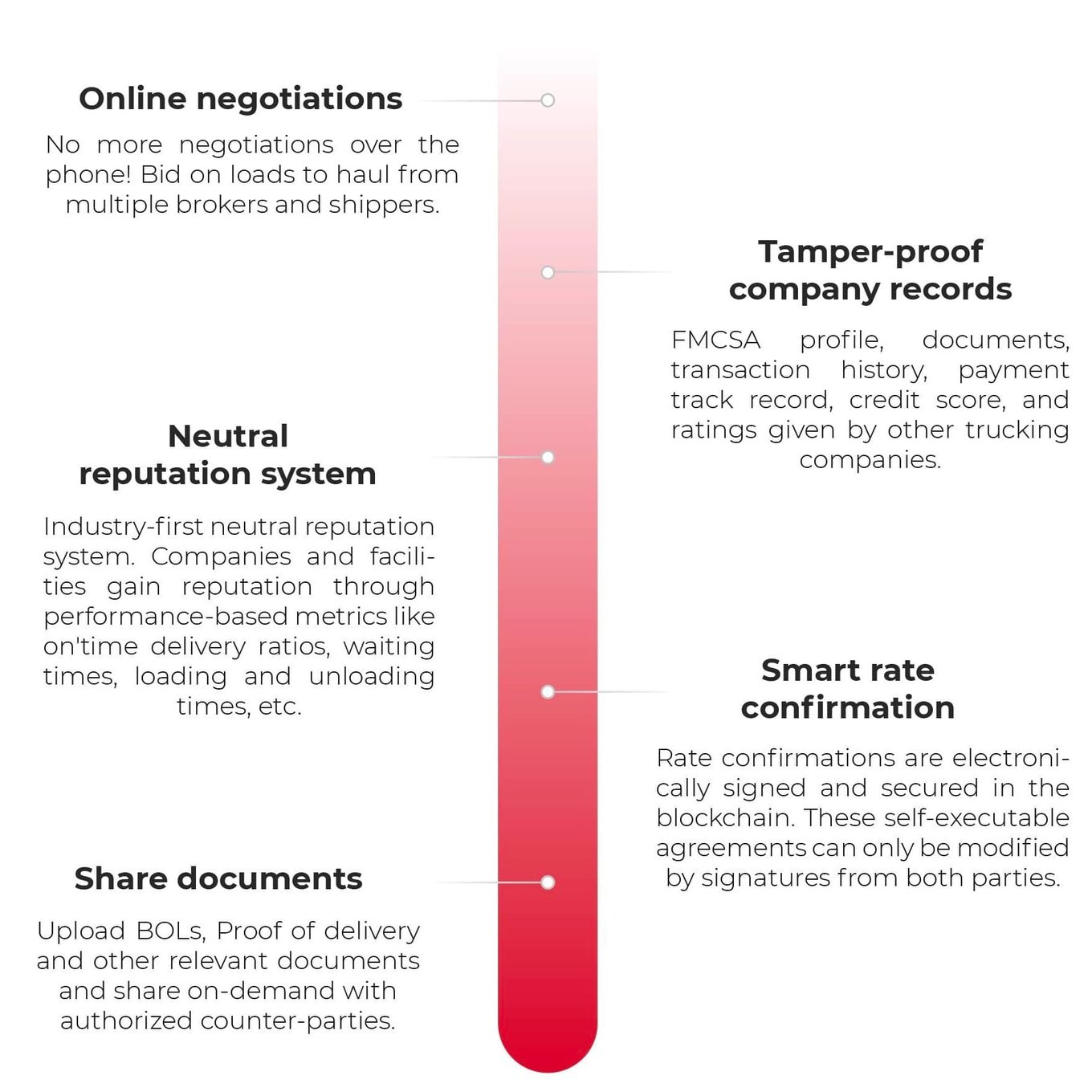
—
Bringing liquidity to small and
medium-sized trucking companies through DeFi
In 2019, dexFreight launched a pilot with MakerDao and Centrifuge to tokenize freight invoices to use them as collateral for accessing liquidity and filling short-term financing gaps for trucking companies.
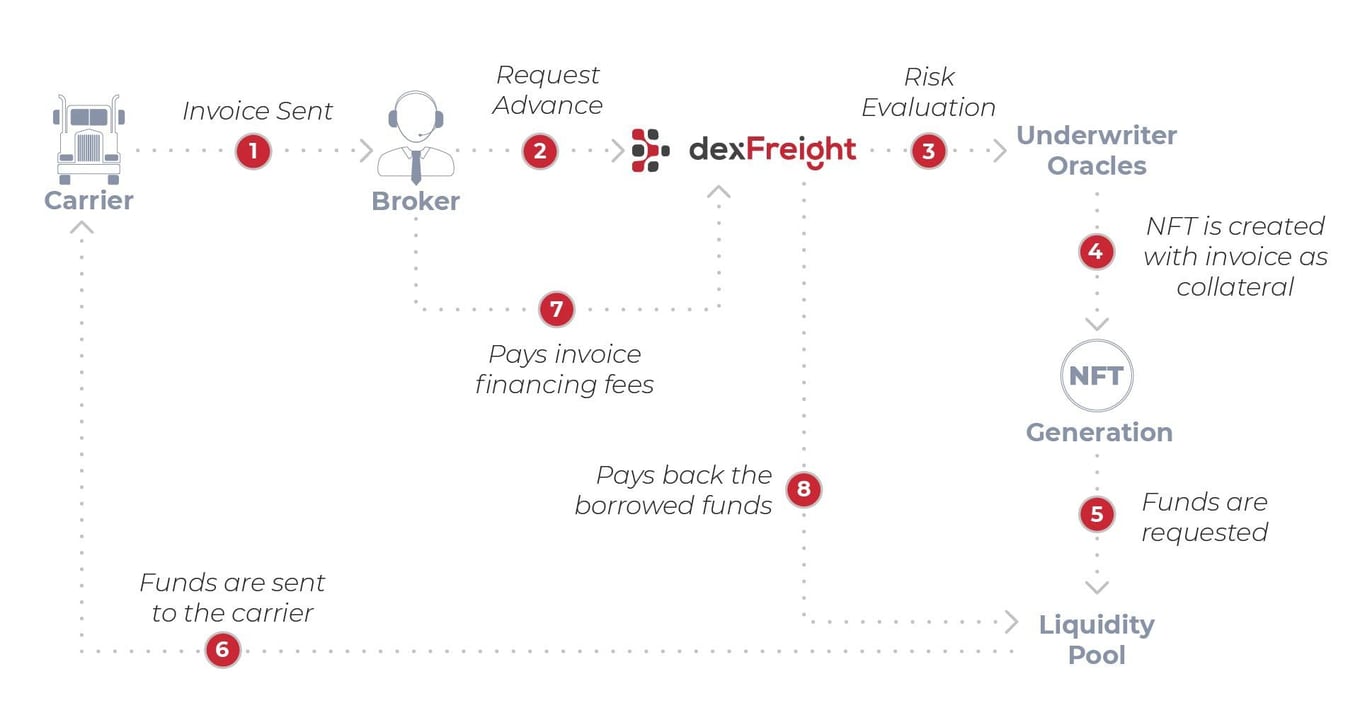
Truckers can get paid right after delivering a load using ‘dexFi,’ dexFreight’s patent-pending technology. This on-demand service provides a low-cost alternative to traditional factoring, in which the broker/shipper pays the finance fee, allowing carriers to get paid faster. dexFi, unlike industry standards, does not require long-term contracts or a monthly volume commitment, providing users with the flexibility to select which loads they want to finance.
—
Plan more efficiently with
Smart Selection Tools
Instead of spending hours posting loads to multiple load boards and tendering loads to carriers via phone calls and emails, with dexFreight, this can be done digitally. dexFreight uses machine learning algorithms to determine the best loads based on the carrier's proximity, their driver's hours of service clock, prior performance, safety records, and other customizable parameters. dexFreight optimization solutions are designed to work in sync with TMS, ELDs, and load boards to successfully automate the whole shipment lifecycle.
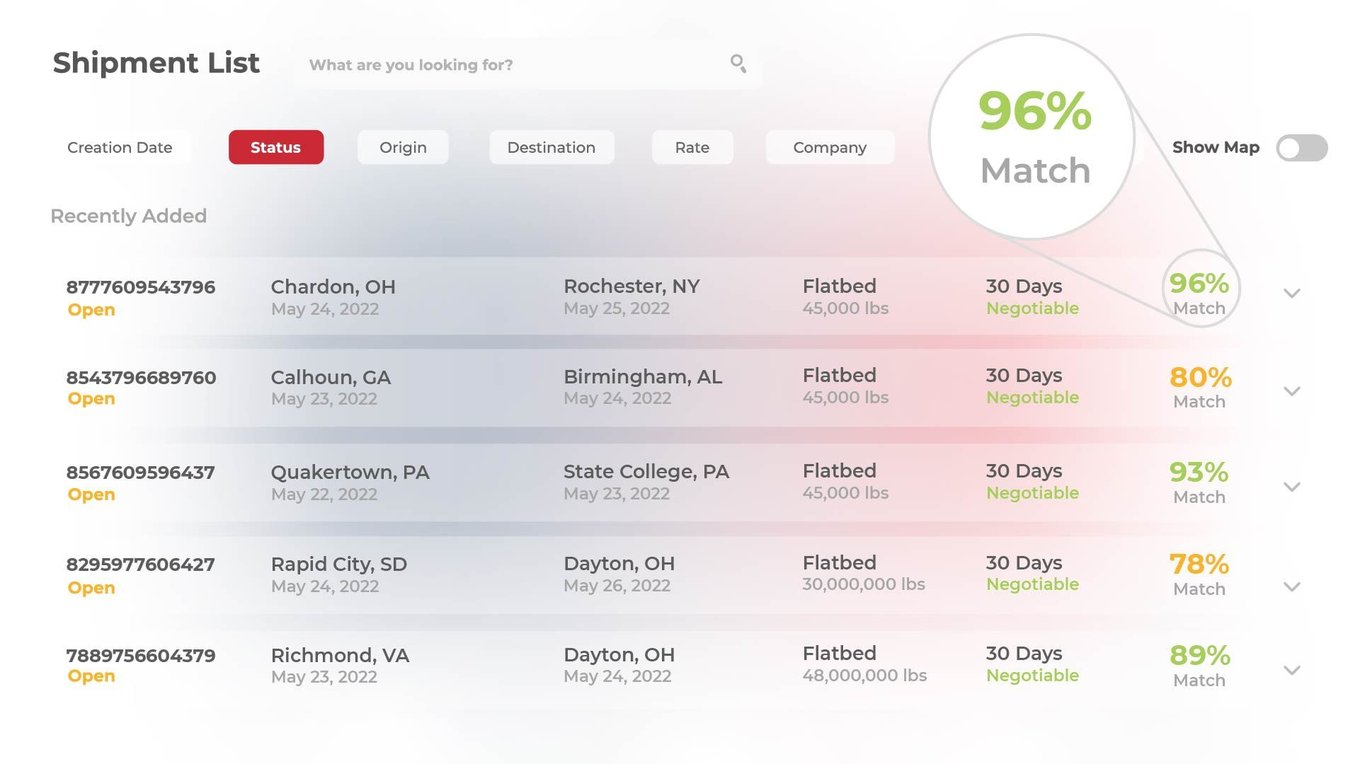
—
Innovating through a
Smart Rate Confirmation
dexFreight is introducing the concept of Smart Rate Confirmation. All terms and conditions stated by both freight companies are cryptographically signed and secured in the blockchain, preventing data from being modified without approval. The agreed-upon terms will then self-execute, meaning if users deliver according to terms, payment will be executed as planned.
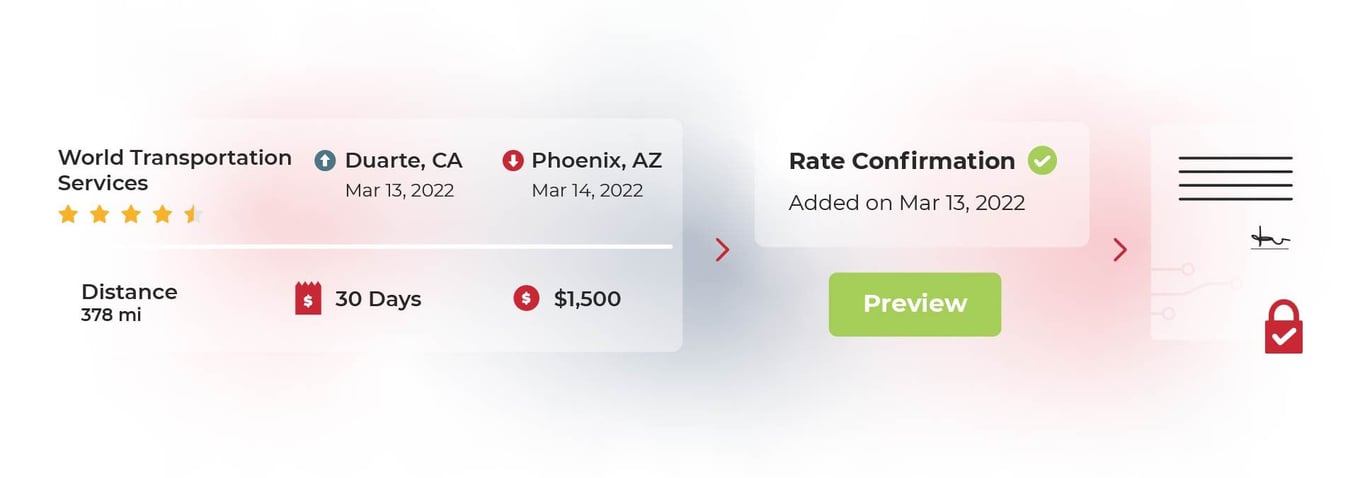
Traction
A growing network connecting the entire logistics industry

dexFreight has over 4,300 companies registered, with 56% of them being small trucking companies based in the U.S. In 2021, users posted more than 42 million loads, worth approximately USD $46B. In that same year, dexFi financed 12.5% of all booked loads, totaling USD $452K in payments processed.
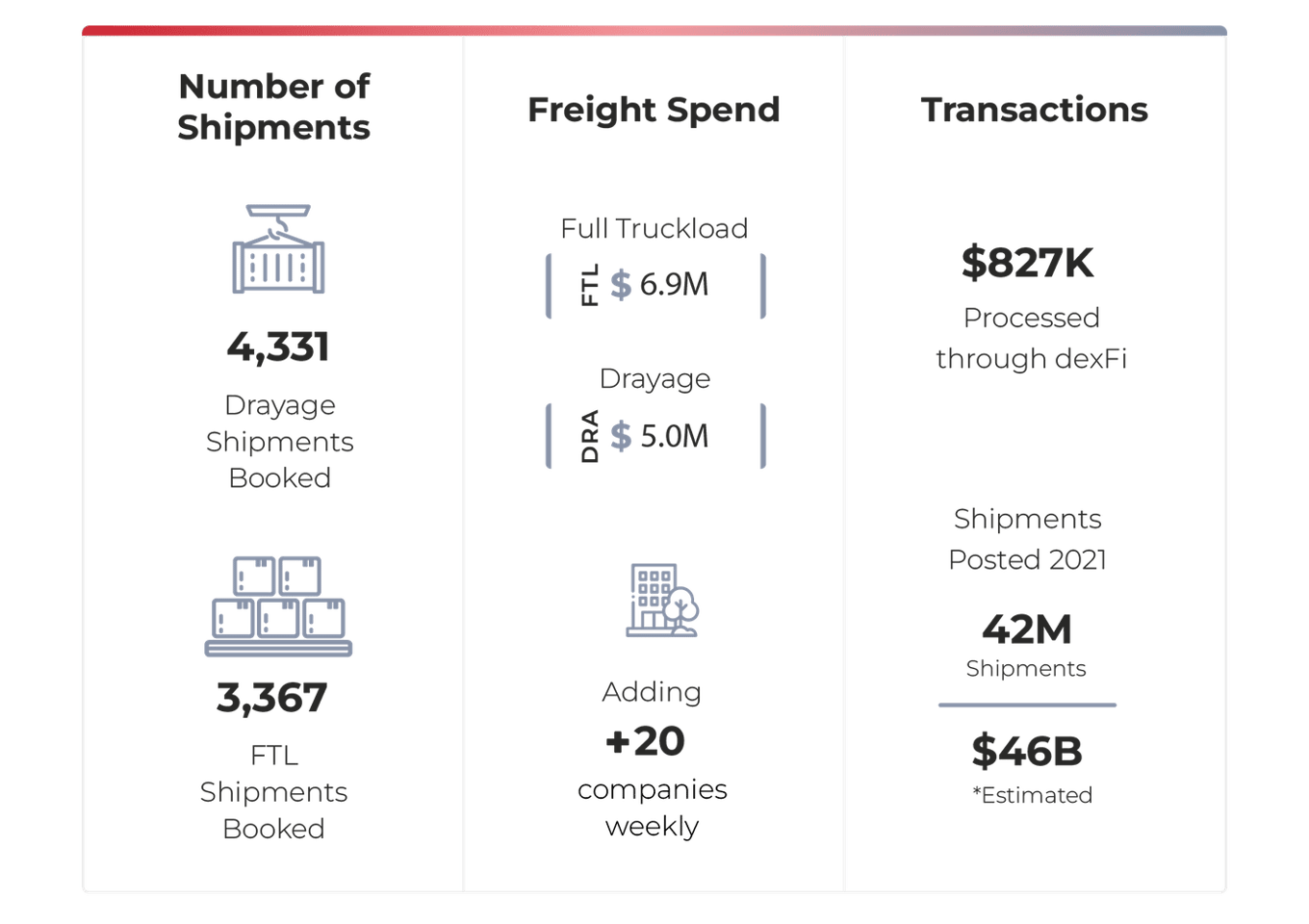
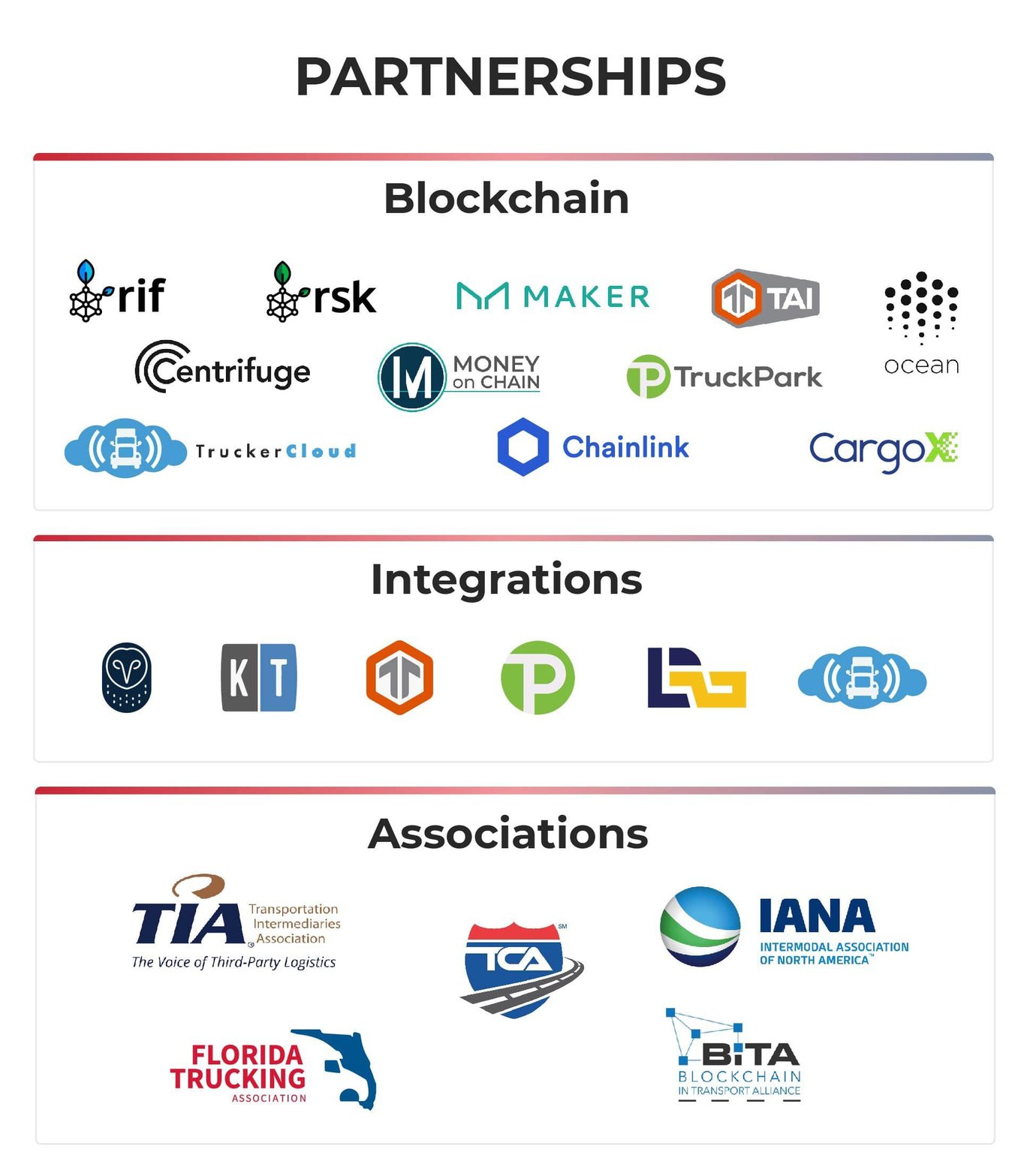
Industry recognition
dexFreight’s vision and innovation in the space have been recognized by the industry. Some awards worth mentioning include:
FreightWaves FreightTech 100, one of the most disruptive and innovative freight technology companies in 2018, 2020, 2021, and 2022. (source)
Supply & Demand Chain Executive magazine as an SDCE 100, one of the top supply chain projects in 2019 and 2020. (source)
Blockchain Awards Latin America as an "Inspiring Project" for our contributions to the ecosystem. (source)
dexFreight was also selected among 225 competing companies for the 500 startups Miami Growth Program in 2019. Our team also completed the Endeavor scale-up program in 2021.
Additionally, dexFreight was included in the World Economic Forum’s whitepaper, highlighting the deployment of blockchain for supply chains. (source)
Throughout our journey of developing dexFreight, we have played an important role in educating the industry about the potential of blockchain technology. As thought leaders, we have been speaking at some of the most important events for the freight and blockchain industries, including SXSW, MarketWaves18, Transparency 19, BITA Symposium, TIA Conference, LaBitConf, Blockchain Academy Mexico, Blockchain Summit Latam, the 2019 Caribbean Shipping Executive Conference, 2019 Mining Disrupt, and SmartFlorida (formerly known as Florida Blockchain Foundation).
Strategic partners
As entrepreneurs solving some of the most challenging problems in logistics, we believe in trying frontier technologies. To do so, we continuously forge partnerships and closely work with the teams behind these innovations. Here are some of our partners:
MakerDAO, Centrifuge, Ocean Protocol, Chainlink, RIF Blockchain Solutions, RSK, Money on Chain, TruckerCloud, TruckPark, TAI TMS, LoadBoard Network, Port community of Veracruz, and CargoX.
dexFreight is always on the lookout for future regulatory changes by being part of multiple industry associations, including:
Customers
Unlocking opportunities
in LATAM
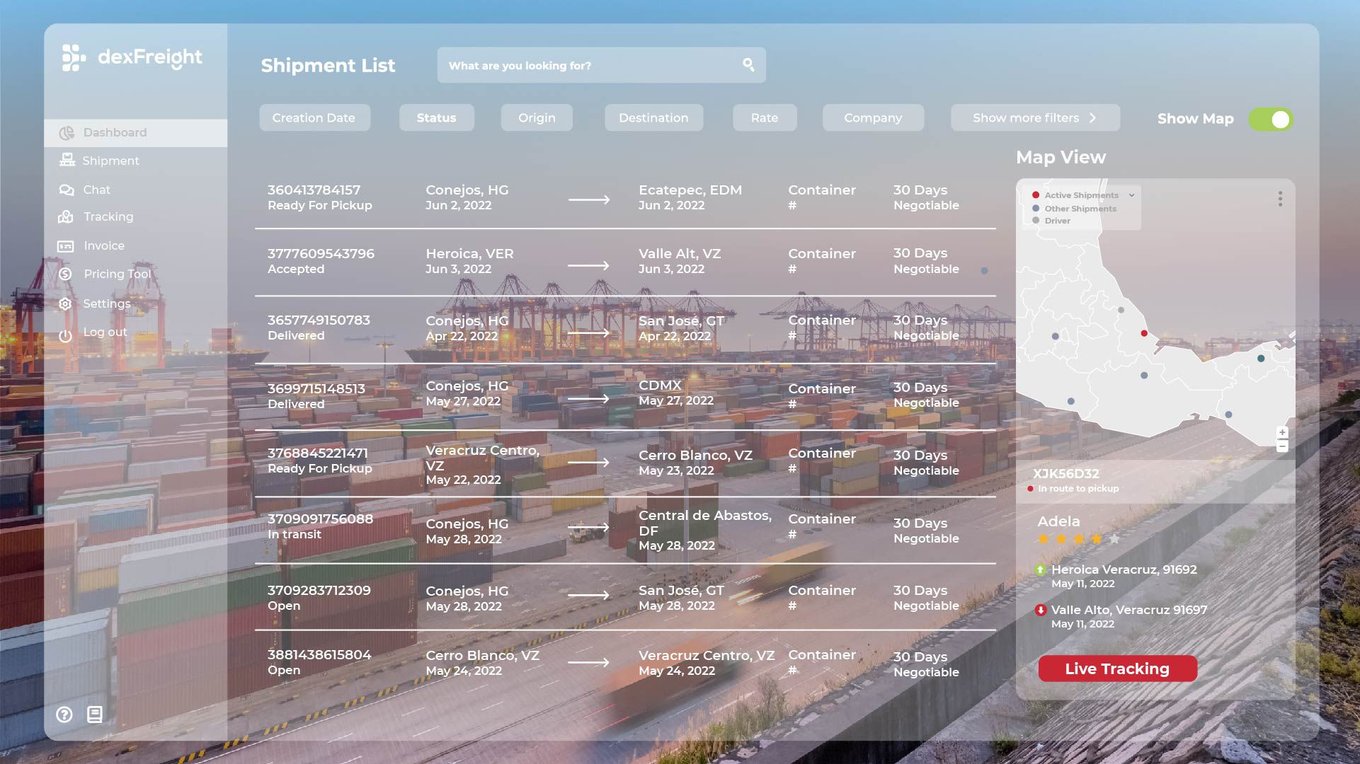
U.S. freight companies have access to a variety of logistics optimization tools such as load boards, transportation, and fleet management systems. Some of these technologies are not yet available in the Latin American market. In contrast to other OECD countries, logistics costs in relation to the GDP are 50 percent to 100 percent higher in Latin American and Caribbean countries. This presents an invaluable opportunity for developing economies to leap ahead by reaping the benefits of this ground-breaking technology.
Partnership with Hutchison Ports Mexico
With this in mind, dexFreight announced its partnership with Hutchison Ports Mexico (HPM) in 2021, to use its infrastructure to process container shipments to and from multiple ports in Mexico. Hutchison Ports is the world’s leading port network, with terminals in over 26 countries worldwide. In Mexico specifically, Hutchison Ports operates 6 port terminals, managing over 829,000 containers annually. The pilot was launched in January 2022 in the Port of Veracruz (one of the most important ports in the Gulf of Mexico, and the third busiest container port in Mexico), and Port of Hidalgo.
During the pilot phase of the partnership, HPM processed over 500 containers using dexFreight, setting a strong use case to expand operations to other ports, with an estimated total opportunity in Mexico of more than 4.5 million containers per year. New announcements coming soon.
The Colombian Opportunity
According to the OECD, Colombia is one of the three Latin American countries with the highest expected growth rate in 2022, making it a potential market to explore. In 2019, dexFreight opened its first office in Colombia and ever since then, has sustained commercial discussions with multiple national companies in the supply chain space. Some of these companies include Asoportuaria, the leading port association in the Caribbean region; Port of Cartagena, recognized as one of the best Caribbean container terminals according to the Caribbean Shipping Association; OPL, a leading logistics company with more than 400 customers, operating over 6,000 trucks; Logicem a multimodal logistics company with nationwide presence; and Compas, a port logistics company handling over 6.5M tons per year.
Agreement with Asoportuaria in Colombia
Asoportuaria is a fast-growing port association in Colombia composed of 12 terminals managing over 12 million tons annually. In May 2022, Asoportuaria signed an agreement with dexFreight, to digitize and optimize port operations through a freight community system.
—
First steps towards a fully-integrated
Logistics Market, LoadBoard Network
In the journey of becoming the facilitating force network to bring more efficiencies and collaboration to the logistics industry, dexFreight signed a partnership agreement with LoadBoard Network LLC (LBN), a recently founded shipment posting aggregation service. Through this agreement, dexFreight provides the back-end technology. This establishes the foundation for load boards and TMS partners to enable shipment processing from booking to payment powered by smart contracts. In future releases, customers will have access to secure online load dispatching, payment features, and financing services through cutting-edge technology.
More than 18 load boards are now integrated with LoadBoard Network. They include 123Loadboard, Trucker Path, FleetOps, Bulk Loads, ComFreight, Direct Freight Services, Five Star Load Board, Fork Freight, Freight Finder, Freight2Cash.com, Internet Freight Terminal, LoadMatch, Load Solutions, Load Surfer, NextLOAD, Single Point Load Board, The Transport Carrier Network, and Trulos.com.
Business model
A SaaS model to keep your shipments moving
Our freemium business model focuses on optimization at scale. Users can post loads and trucks, automatically match loads and trucks, onboard, and negotiate with carriers.
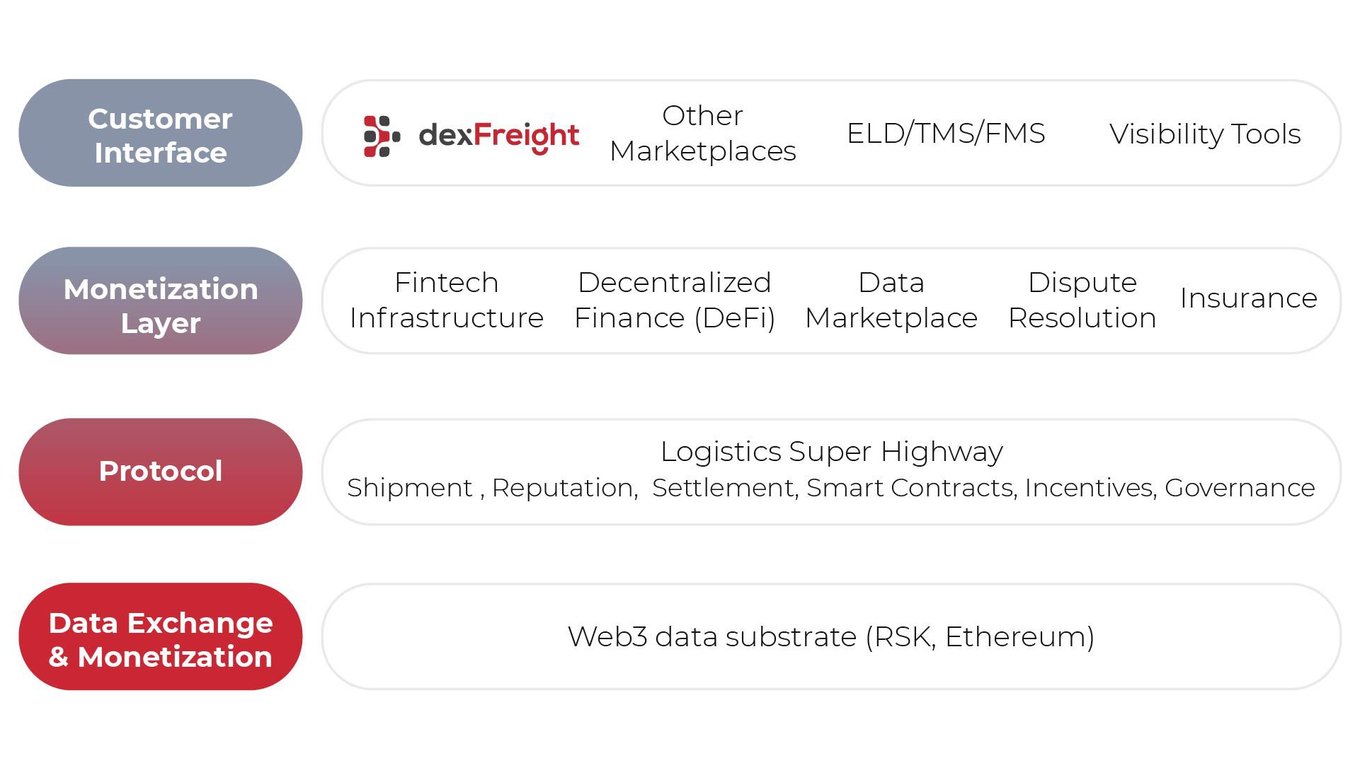
dexFreight generates revenue by providing value-added solutions as premium services, including:
Freight payments through traditional and crypto payment rails
Immediate payment and financing to brokers and carriers (dexFi)
Price predictions (dexRate)
Drayage marketplace
Load consolidation and load chaining
Smart routing, considering HOS, fuel, weather, parking and other variables
For techies
If you have come this far looking for technical information. Here is a graphical representation of dexFreight’s tech stack.
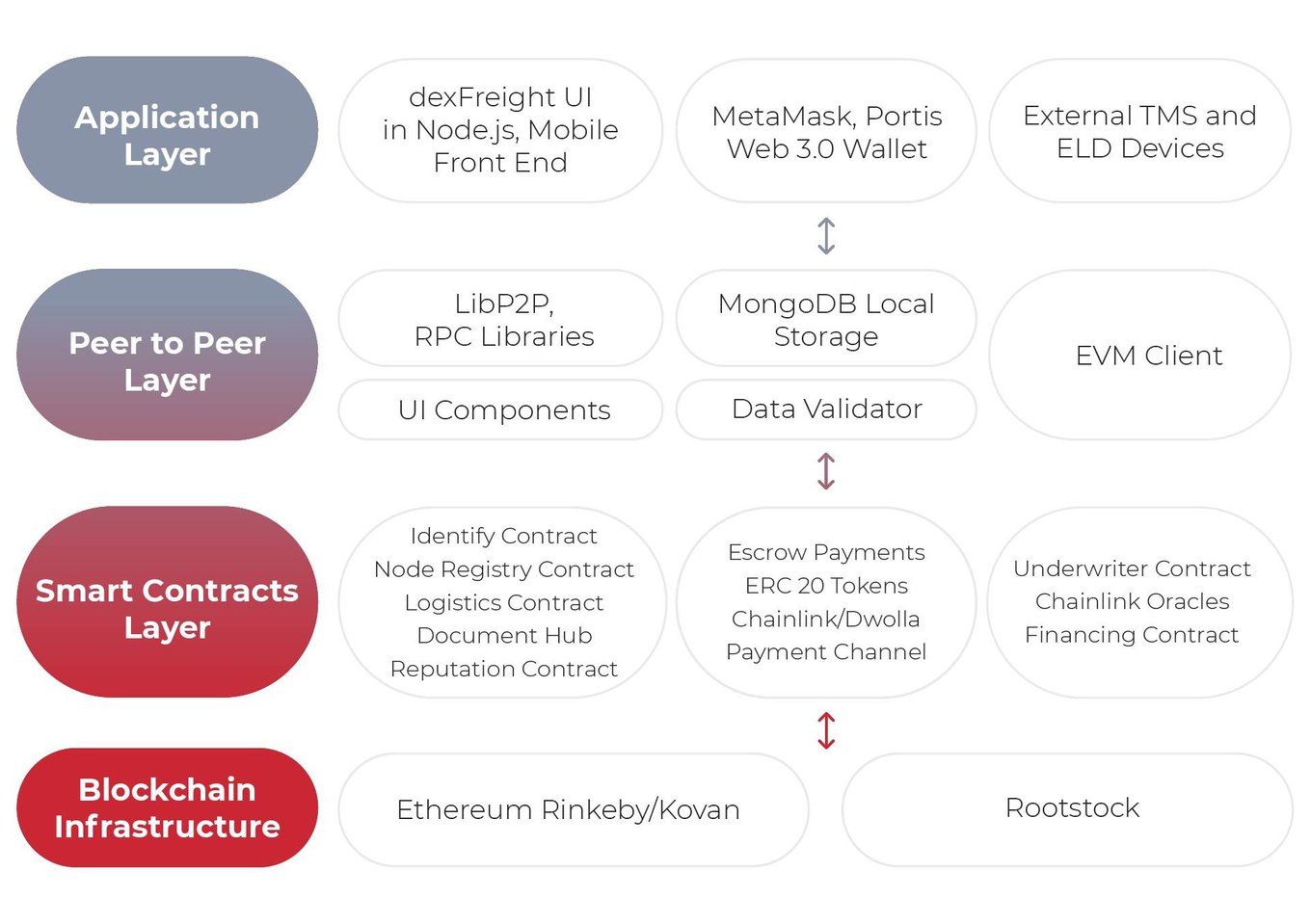
More information on our machine-learning algorithms can be found here, here, and here.
Market
A multi-trillion
dollar market
The worldwide logistics business is estimated to be valued between USD 8 trillion and USD 12 trillion annually, contributing to 12% of the global GDP. dexFreight is designed as a globally scalable network for multiple modes of transportation. Our initial markets include The United States, Mexico, and Colombia.
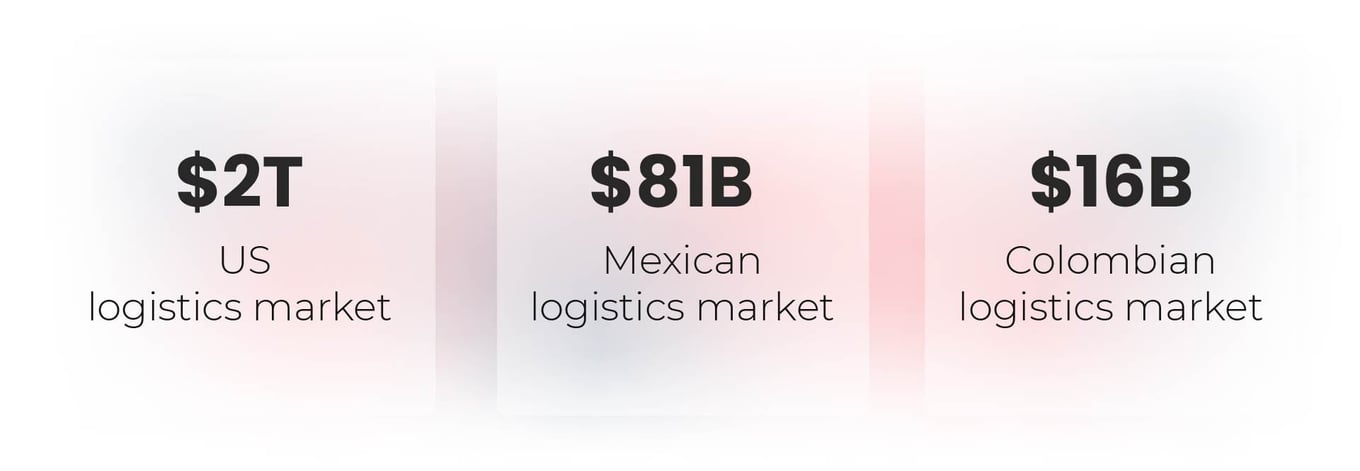
The US Market
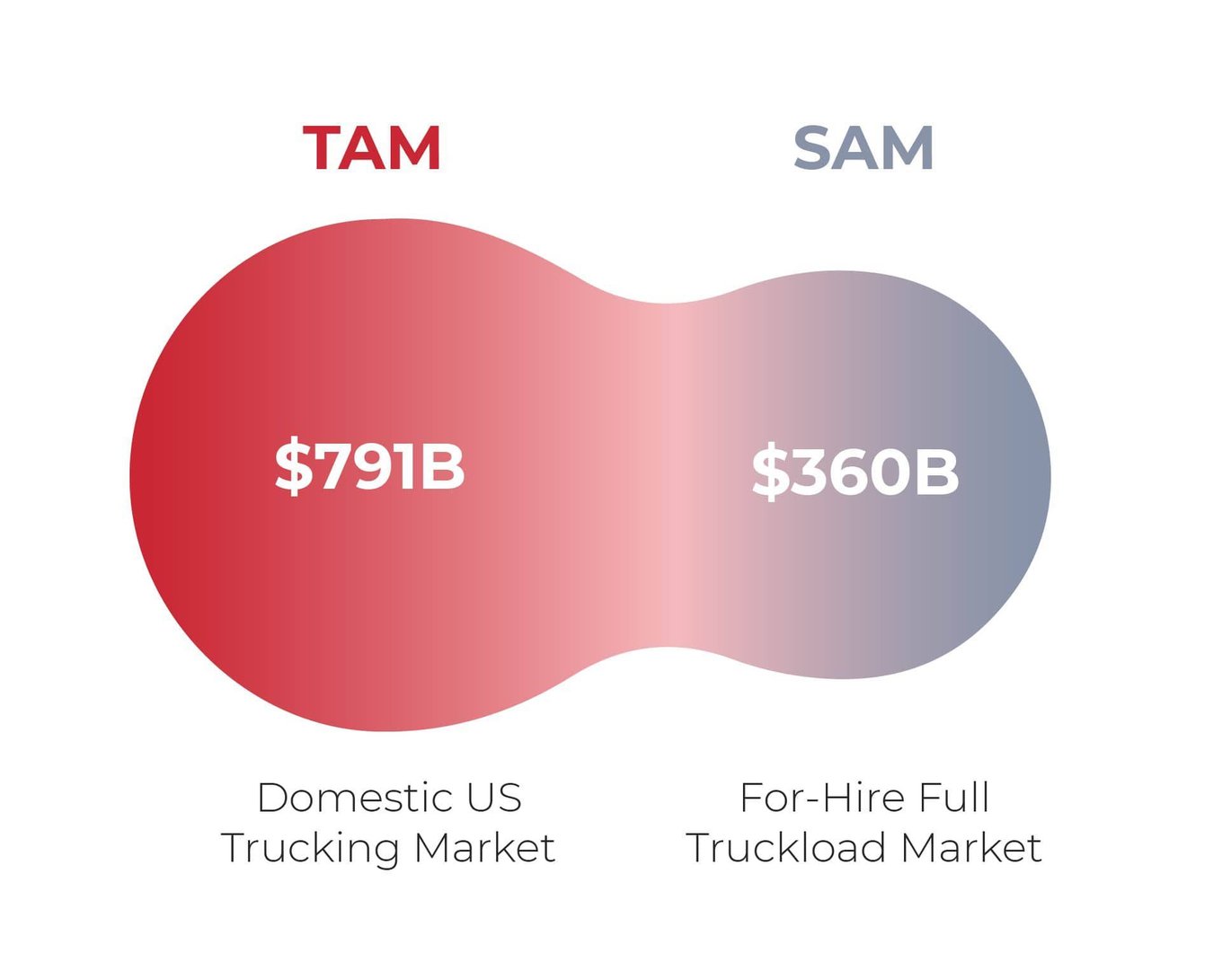
The United States represents the world’s largest economy, valued at USD 20.9 trillion in 2020. The country’s real GDP increased by 5.7% in 2021 and is projected to grow by 2.5% in 2022. The US logistics market is estimated to be worth USD 2 trillion, or 10% of the country’s GDP.
dexFreight's main focus is the USD 791 billion trucking market in the US, specifically the for-hire full truckload market, worth approximately USD 360 billion.
For more industry data, please refer to the Problem section of this page.
The Mexican Market
With a GDP of USD 1.07 trillion, Mexico ranks as one of the world's top 15 economies. According to the OECD, the country's GDP is predicted to grow by 1.9% in 2022. The logistics market accounts for 7% to 22% of national GDP, with truck transportation comprising about 3.39%. Over-the-road transportation accounts for over half of the total ton-km managed in Mexico, making it the main transportation mode.
Mexico's trucking industry, like that of the United States, is characterized by several small businesses competing against large fleets. In fact, owner-operators represent 81% of the market. Most Latin American markets indicate widening inequalities between small and large businesses, making it difficult for small freight companies to incorporate new technologies because they have limited access to credit and must rely on auto financing.
The Colombian Market
Colombia’s economy was valued at USD 295 billion in 2021, making it South America's fourth-largest economy. Despite the COVID pandemic, the country’s economy is rapidly rebounding, with a 6.1% projected for 2022, becoming one of the fastest-growing economies in Latin America.
The national logistics market is worth USD 16 billion, accounting for approximately 5% of Colombia’s GDP. Road freight transport is this country's most common mode of transportation, with about 98% of the country’s ton-km. This market is characterized by low levels of digitization, where only 40% of truck trips get documented.
Competition
How are we different?
Leveraging smart contracts and machine learning to optimize logistics at scale
A smart contract is a computer program implemented in blockchain and contains the terms of the agreement between parties. The code and the agreements contained therein, exist across a decentralized blockchain network and are intended to execute automatically. As a result, transactions are traceable and tamper evident.
We are using this powerful technology to facilitate transactions between freight companies that don't necessarily know or trust each other. By providing an immutable performance-based reputation system and standardized business rules, we reduce the cost associated with building business-to-business trust, which usually relies on unenforceable legal agreements like rate confirmation.
At a larger scale, we use the same principles to implement the decentralized protocols to create an Open Logistics Network, designed as a network of networks for freight-tech companies to exchange live market information (real-time loads and capacity availability). This enables end-users to book shipments across multiple siloed platforms and marketplaces without having to leave the platform or systems they currently use.
OLP provides freight tech companies a common utility backend upon which they can build innovative products and services for their customers.
Vision and strategy
Our vision is to simplify logistics for a better world...
...by enabling coordination at scale, encouraging collaboration, and incentivizing a fair and equitable distribution of value.
Our Mission: Build the universal decentralized, open-source network that enables collaboration and facilitates the coordinated movement of goods while bringing liquidity to the supply chain.
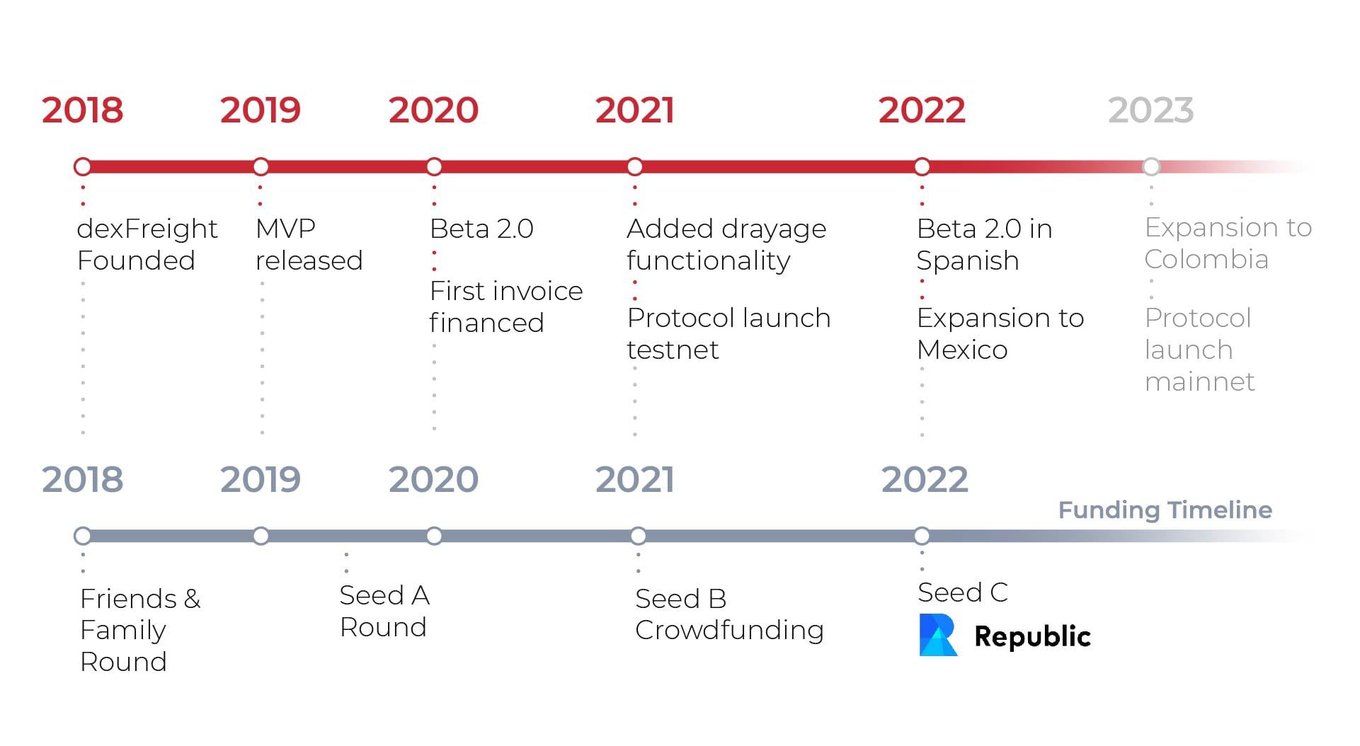
Funding
Over $4M raised to date
As of today, dexFreight has raised over $4 million from multiple industry players, including freight brokers, shippers, trucking companies, and strategic investors. In 2021 took an important step towards democratizing investment opportunities in the company, which resulted in an oversubscribed initial crowdfunding round, with over $1,000,000 million raised from more than 900 investors.
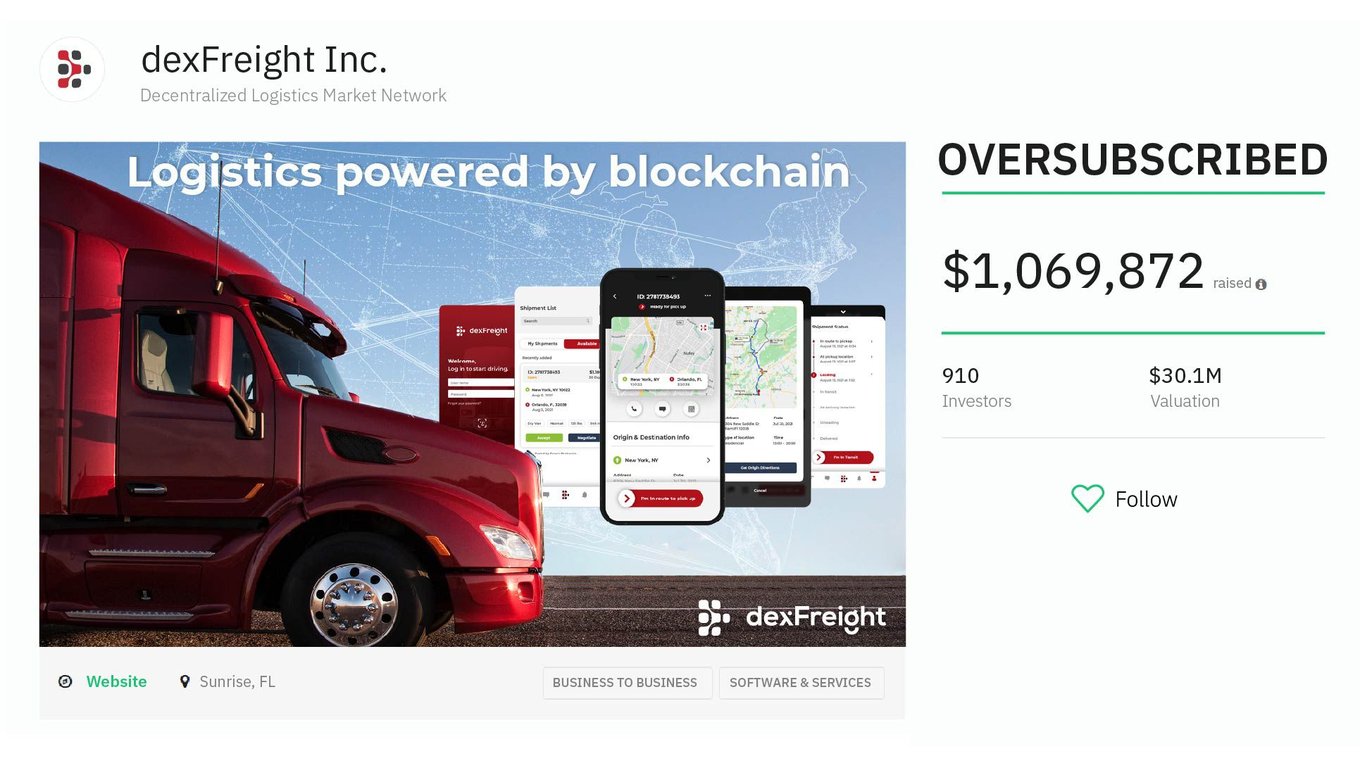
Capital raised here on Republic will be used for business expansion in LATAM, in addition to business development efforts in the U.S., sales and marketing, research and development, the expansion of customer success operations, and infrastructure maintenance.
—
Investor testimonial
Leadership
We understand the pains and challenges of the
logistics industry
With an average of 20 years of experience managing and growing SMBs and multi-billion dollar organizations, our multidisciplinary leadership team brings together the necessary knowledge and capabilities in logistics, technology and entrepreneurship.








 Oops! We couldn’t find any results...
Oops! We couldn’t find any results...

